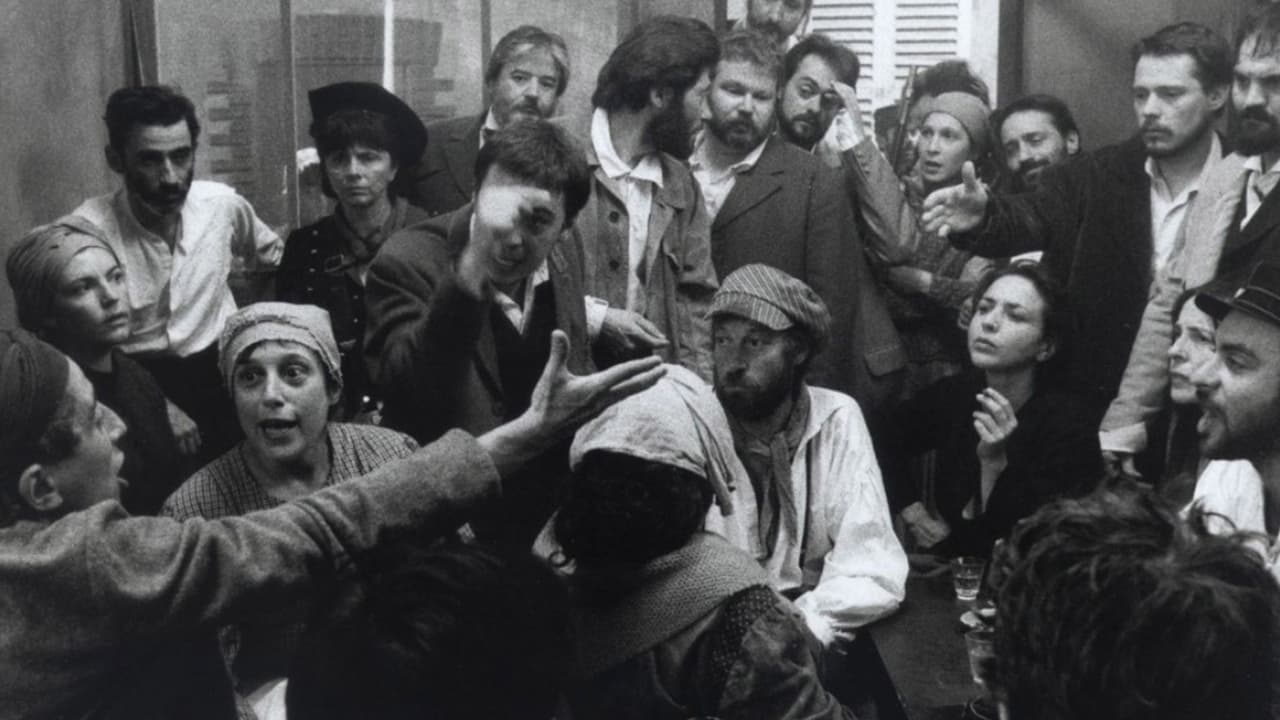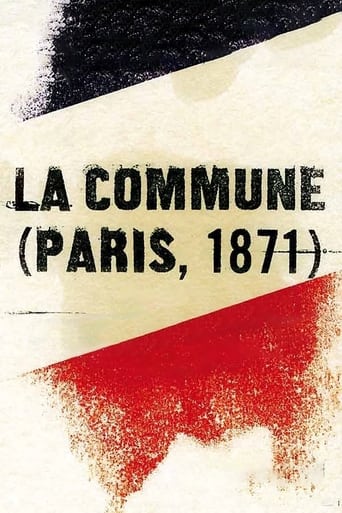

Instead, you get a movie that's enjoyable enough, but leaves you feeling like it could have been much, much more.
... View MoreI am only giving this movie a 1 for the great cast, though I can't imagine what any of them were thinking. This movie was horrible
... View MoreI think this is a new genre that they're all sort of working their way through it and haven't got all the kinks worked out yet but it's a genre that works for me.
... View MoreIt is an exhilarating, distressing, funny and profound film, with one of the more memorable film scores in years,
... View MoreEnglish screenwriter, film editor and director Peter Watkins' documentary drama which he co-wrote with screenwriter and researcher Agathe Bluysen, is inspired by real events which took place in the capital city of France during two months in the early 1870s. It premiered on German television, was shot on a set at a factory in France and is a French production which was produced by producer Paul Saadoun. It tells the story about the many citizens of the Third French Republic (1870-1940) and how the history of their nation and Europe was changed during the course of sixty-five days of political revolt by a federation of elected delegates called the National Guard and working class civilians who were dedicated to defend their country and colony from a monarchist restoration and a Prussian invasion by the first Chancellor of Germany Otto von Bismarck (1815-1898), and create an egalitarian social republic. Distinctly and engagingly directed by English auteur filmmaker Peter Watkins, this finely paced reconstruction which is narrated by the director in written words, by two television journalists for Commune TV named Blance Capellier and Gerard Bourlet and interchangeably from multiple viewpoints, draws an informative and interactive portrayal of political philosophy. While notable for its atmospheric milieu depictions, reverent cinematography by cinematographer Odd-Geir Sæther and costume design by costume designer Eloide Delaux, this dialog-driven and narrative-driven story where themes like communalism, authoritarianism, radicalization and management of political power are exemplified and debated, is a collective study of an historical period in French history which explains hierarchical and other methods used in audiovisual media and other educational systems like religious or state education whilst using a singular process of filmmaking where the many participants who had to adapt to the production democratically and not merely examine and represent their characters but also express their own views on them, the central theme and the making of the film, goes beyond acting with their personal commitment. This increasingly reflective, densely biographical and extrovert narrative feature from the early 2000s which is set mostly in Paris and in Versailles, France in the late 19th century seventy-three years before women obtained the right to vote in France, and after the fall of emperor Napoleon Bonaparte III (1769-1821), the Second French Empire (1852-1870) and the Franco-Prussian War (1870-1871), and where the fictitious place coined by a 16th century English Roman Catholic which centuries later became a reality due to human beings is reenacted, is impelled and reinforced by its cogently fragmented narrative structure, subtle character development, rhythmic continuity, use of photographs, introduction to historical people like a French school teacher known as the red virgin of Montmartre who used the pseudonym Clémence and parallels between the political climate of the 19th and 20th century. A reclaiming, ideologically ingrained and justified homage to French children, women and men.
... View MoreI don't think this is Peter Watkins's "best" film, exactly. It lacks the discipline and precision of "Edward Munch." But this is the purest example of the potential of Watkins's practice. Few films I've ever seen have felt as alive as a collaboration between a director and a group of performers. The non-actors, denizens of a working-class neighborhood of Paris, lived together and collaborated with Watkins as a legit, studio-based commune during their re-enactment of the events of Paris, 1871. In the film's second half, the reenactment subtly starts to occasionally give way to conversations between the performers during the course of the production. The past starts to seem truly "re-enacted," as the "present" seems to become part of a work of historical story-telling. In the final scenes, the actors seem to go into a kind of trance of fury as they sing revolutionary songs while awaiting to defend the city from Versailles' soldiers. Many turn to the camera and say that they would pick up guns to fight for a new commune in the present. As a viewer, I believed them.This film also goes farther in its critique of media than Watkins' earlier films. All of Watkins's films feature a contemporary documentary camera crew interviewing historical figures in a way that is quite confrontationally unnatural. In the previous films, the (seemingly) Watkins-led camera crews were portrayed as the allies of "the people." Here, the larger canvas allows for a more nuanced critique of even "people's media." Two media outlets vie for the hegemony of the viewer: Versailles News and Commune TV. Even Commune TV, the "ragtag, independent" news outlet is presented as always veering towards the most relatively conservative seats of power. The Commune reporters consistently defend the (I think rather inappropriately maligned) "professional" Commune leadership from the masses. (As much as I admire Watkins, he is undeniably an ultra-leftist.) I wonder, however, if this more complex take on the media is not tied to the more complex layerings of "realities" in this work that I discussed in my first paragraph. For, unlike, in the earlier films, here the "progressive" media outlet (Commune TV) is not the "highest" reality, and therefor is not directly attached to Watkins himself. It is only part of the historical fiction that Watkins implements to show his performers embrace the political heritage of the Commune. In the scenes where the performers discuss their experiences of the production with each other, Watkins name is only ever mentioned with reverence. The filmmaker deepens his critique of media, but not of his place within it as a "radical saint."
... View MoreI am trying to remember when I first heard about this film. I think in Frech periodicals when an anniversary of the Commune took place. Latter there was mention of Peter Watkins in a French cinematic magazine- I think Cahiers du Cinema- which I saw and failed to buy. Finally I ordered the film from the organization that Peter Watkins has set up for the promotion of the film, Rebonde pour la Commune. Reflecting on another viewers comment they were not very commercially minded as Harry Potter for example.But the movie was worth it. It is absolutely of the beaten track. Although the events are known to anyone even relatively familiar with modern French history the rendering of the events by the filmmaker is based on two supremely ingenious innovations-one, the idea of transplanting audiovisual journalism in the 19th century- the device of introducing an official TV channel backing the government line and also two young journalists with microphones speaking and interviewing the Communards while the revolution was happening.Two,the idea of making the actors relate their cinematic experience as revolutionary actors with the present political conjecture.Those two ideas were very impressive although the second destroys the momentary suspension of disbelief on which every spectacle is based but that device of exposing the illusory character of a public spectacle has been known since the time of Aristophanes. I do not find it personally the most preferable but I think in such a movie it has a place. As for the idea of introducing modern media in the 19th century visual narrative, I found it brilliant since displayed the ability of modern propaganda devices in a earlier historical setting.The propaganda powers of the moving visual image is something historically unequaled- one can not compare its power with the pictures of biblical themes in the interiors of medieval churches or with the suggestion created by statues and temples in antiquity-Augustan Rome for example.Modern historians of the Commune have as sources the written word, the press and photographs that existed then and were used by the police to identify suspects. But film is another story-I can not remember if Watkins cites his sources but the movie follows a factual rendering of the Commune day by day and this is how it is structured with the emissions of the media used as interludes. An admirable achievement. P.S. I can not but observe the difference between this movie and the film about Marie-Antoinette. Of course the perspective was different since the film about the Queen was pro-royalist while the film about the Commune was pro-revolutionary but many other differences existed. The film of Watkins was based on the assumption that history is made by the masses whose action he tried to portray while Coppola's film was based on the assumption that history is made b personalities- by members of the ruling elites, since crowds- not smart crowds- but real crowds appear only once in Coppla's movie and then only in terrifying and then malleable fashion.I can not imagine a more fundamental difference of rendering events related to two of the major French Revolutions- a tribute to the richness of life and art that seeks to portray it.
... View MorePeter Watkins' nearly 6-hour long docudrama, "La Commune (Paris, 1871)," is a surprisingly passionate and fast-moving lesson in history. It is also a brilliant demonstration of how history is shaped, and re-shaped, by the tellers of the tale.Using the "You Are There" approach of earlier radio and TV days, Watkins has a male and female news team from "Commune TV" wandering through the poorest district of Paris inviting people to express their grievances against the state to the camera.While the people bitterly suffer because of the government's inept defeat at the hands of the Germans during the Franco-Prussian War, their anger inspires solidarity for them throughout Paris, and although they briefly rise up and seize power, they are brutally put down in the end.Ironically, during the course of their uprising, a TV monitor in the background features happy-talk "Versailles TV" news anchors, who continually vilify the Communards and rationalize the government's brutal acts of supression."La Commune" is a must-see for students of history, and a must-see for students of the media.
... View More